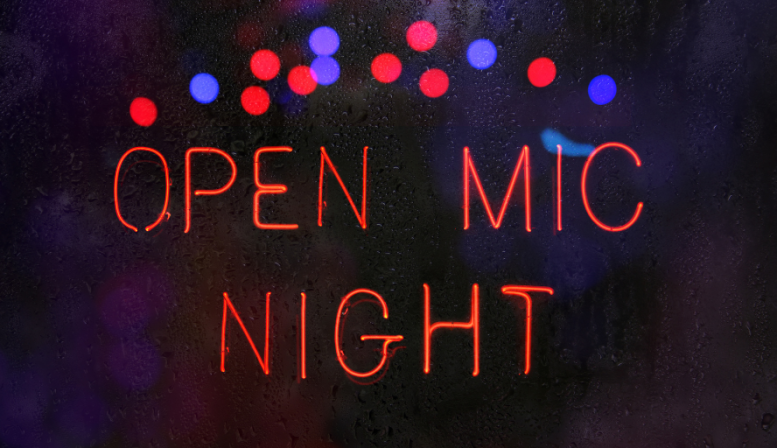Can Open Mics Help You Overcome a Fear of Public Speaking?

Open mics can provide interesting opportunities for public speakers, giving them the chance to get behind the mic in front of a live audience in a unique setting that can’t easily be found elsewhere. But are they really worth experimenting with?
Some people say yes and some people say no, and in today’s article, we’re going to take a look at both sides of the coin before we share our overall thoughts with you. So if you’re ready, it’s time to step up to the mic and get started.

Yes
1. You can try routines
One of the great things about going to an open mic is that you’re given free reign to try out anything you want. That’s one of the reasons why musicians and stand-up comedians use open mics to test out new material – they’ll try something out at the open mic and then make it a permanent part of their set if it goes down well. Public speakers can benefit in exactly the same way.
2. You’ll learn to entertain people
Open mics mean that you’ll be forced to learn to entertain a crowd. Even when you have everything planned out and perfected, there will always be moments where you’re forced to improvise, such as if some of the technology isn’t working and you need to fill out time. Fortunately, these skills start to come naturally after a while, and you’ll soon find that entertaining people comes as second nature. That can then help you to make more engaging presentations.
3. You’ll get used to using a microphone
One of the great things about taking part in open mics is that you’ll get used to holding and talking into a microphone. That’s good news, because it’s a necessity as a public speaker. You’ll want to learn how the distance you stand from the microphone can affect the way that your voice is projected, and you’ll also want to get used to speaking into a microphone instead of just speaking out into the open air.
4. You’ll get positive feedback and encouragement
Open mics are generally supportive places, and you’ll find that most of the people that you share the bill with will be more than happy to provide you with feedback and encouragement. If it’s constructive criticism that you’re looking for, you might be better off looking elsewhere, but if you want to hear about what you do well and to receive a much-needed boost of confidence, open mics could be a good choice for you.
5. You’ll be able to learn from other people
Open mics bring you into contact with likeminded people, and that provides you with plenty of opportunities to learn from them. This tends to happen in a couple of different ways. The first is that you’ll be able to watch what they do and to emulate the aspects of it that you like. The second is that open mics tend to facilitate the exchange of information between people; so you might find yourself picking up tips while chatting to people between acts or after the open mic is over.
No
1. You’ll go off on a tangent
Open mics are almost always geared towards performances, and many of them are exclusively for musicians. Even when they do allow you to practice your public speaking, you need to be careful not to go off on a tangent and fall down a rabbit hole where you end up practicing performance more than you practice your public speaking. You need to remember that you’re attending open mics for a reason.
2. You won’t necessarily learn transferable skills
This builds on from the last point, and the general idea here is that there’s no guarantee that the skills you’re going to learn from attending open mics will transfer to your public speaking. Realistically, it’s likely that some of the skills you learn will come in useful while others won’t. Either way, you could end up spending a lot of time learning skills that won’t actually help you throughout your speaking career.
3. You could damage your confidence with a poor performance
We talked earlier about how people at open mics tend to be fairly supportive, and that’s true. It’s unlikely that you’ll find yourself on the receiving end of harsh words or unconstructive criticism. The problem is that we’re our own biggest critics, and if we give a poor performance at an open mic, there’s a real risk that we’ll take that to heart and end up undermining our self-confidence.
4. You might teach yourself that you need a drink
Many open mic events take place in bars and other locations where alcohol is for sale, and it can be tempting to have a drink or two to take away the nerves and to boost your confidence. The problem is that there’s a risk that we’ll end up accidentally teaching ourselves that we can only get through public speaking engagements by having a drink, which is no good – for obvious reasons!
5. You might compare yourself to more seasoned performers
If you go to open mics and spend a lot of time watching other performers, you’ll inevitably start to compare yourself to them. That can cause problems if they’re at the top of their game and you’re still learning, because you’ll only see the best things about their performances and the worst things about your own.
Maybe
As you can probably guess from the title of this section, the real answer to the question of whether open mics can help you overcome a fear of public speaking is that perhaps they can, and perhaps they can’t. It really depends upon the kind of person that you are.
With that said, it’s important for public speakers to know all the options that are available to them, and open mics are just one of those options. If you’ve never been to one, it’s worth giving it a go to see whether it works for you. And if you have been to one, you should already know whether you’ll find them useful.
That’s it for this week, so now it’s time for us to hand it over to you. As always, we’d love to hear your thoughts, so be sure to let us know in the comments so that we can keep the discussion going. You can also follow us on your favorite social networking sites for more. We’ll see you soon for another article!

